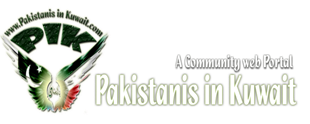Kuwait News
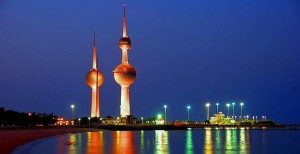
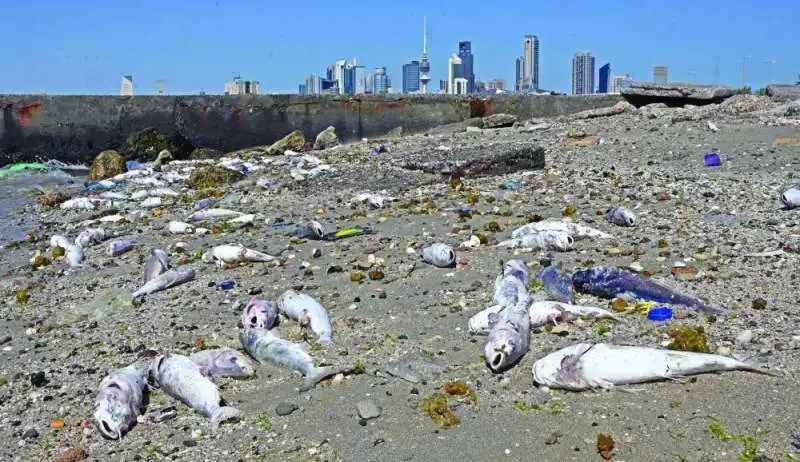
KUWAIT: A concerning incident unfolded along the shores of the Shuwaikh region as a significant number of fish were found dead, strewn across the beach from opposite the Petroleum Corporation building to the National Assembly building. The distressing sight, brought about by waves from Kuwait Bay, has prompted swift action from local authorities.
Marzouq Al-Azmi, Deputy Director of the General Authority for Agriculture for the Fisheries Sector, shed light on the situation, acknowledging the limited scale of the fish mortality near Al-Salam Beach and Shuwaikh. He attributed the phenomenon to various factors, including environmental stressors such as rain outlets, red tide occurrences, and the degradation of seawater quality due to human activities.
In response to the crisis, the Authority has reached out to the Environment Public Authority to assess the extent of mortality and explore mitigation measures. Al-Azmi assured the public that efforts are underway to clean the coastline and remove the dead fish in collaboration with relevant agencies.
Furthermore, plans are in motion to convene a committee to investigate the recurrence of such incidents, analyze underlying causes, and devise preventive strategies.
Dr. Abdullah Al-Zaidan, Deputy Director General of the Environment Public Authority for Technical Affairs, provided additional insights into the situation. He explained that the annual mortality of jade fish, observed around mid-April, is attributed to coastal sewage sources affecting water quality, leading to phenomena such as red tide and nutrient enrichment.
Al-Zaidan emphasized that the current mortality event is exacerbated by the fish’s migration patterns and reproductive behavior, making them susceptible to the adverse effects of environmental pollutants and red tide blooms.
Efforts are underway to monitor environmental conditions through advanced forecasting systems and satellite imaging, collaborating with state agencies, the Kuwait Institute for Scientific Research, and the Regional Organization for the Protection of the Marine Environment. These measures aim to assess chlorophyll levels, sea surface temperatures, and the presence of red tide, facilitating proactive responses to mitigate further fish mortality incidents along the affected coastline.

KUWAIT (Agencies): The weekend weather will be warm to hot during the day and moderate at night, marked with relative humidity and unsteady and hot southeasterly winds, the meteorological center said on Thursday. The center director, Abdulaziz Al- Qarawi, said in a statement to KUNA that the weather during the rest of today would be largely hot with the temperature forecast at 34-35 degrees, but will turn moderate at night. Friday will see a tendency towards warmer temperatures, accompanied by some moisture in coastal areas.
The forecast heat will range between 35 and 37 degrees. The weather at night will be moderate with some humidity. On Saturday, it will be hot with temperatures ranging between 36 and 38 degrees and fall to 22-24 degrees at night. Meanwhile, recent extreme weather conditions experienced by several Gulf Cooperation Council (GCC) countries, notably Oman and the United Arab Emirates, have sparked discussions about the profound impact of climate change on life in the Arabian Gulf region, reports Al-Jarida daily.
This dialogue, facilitated by a symposium organized by the Cultural Committee in the Department of Psychology at Kuwait University in collaboration with the Ministry of Awqaf, underscores the urgent need for developing an emergency system to address extreme weather phenomena such as heatwaves and heavy rainfall, which pose significant challenges and are notoriously difficult to predict. The unprecedented rainfall witnessed in the region, resulting from a depression, may signify a transformative shift in the climate patterns of the Arabian Gulf.
The occurrence of “rain bombs,” equivalent to two years’ worth of rainfall in a single day, highlights the potential long-term implications for the region’s inhabitants, ranging from infrastructure damage to impacts on sanitation systems and city design. Climate scientists have long warned about the dangers of global warming and its repercussions on various aspects of life, including food and water security, extreme weather events, and public health. The Paris Climate Agreement, adopted by 197 countries in 2015, aims to mitigate climate change and limit global temperature rise to within 2 degrees Celsius. However, the challenges posed by climate change require a comprehensive and proactive response from GCC countries.
This entails expanding scientific research efforts to better understand the severity and extent of climate change impacts, as well as developing adaptation strategies to safeguard public health, infrastructure, and natural resources While acknowledging the responsibility of oil-producing nations in addressing climate change, it is essential to approach the issue with professionalism and scientific rigor. This includes investing in research and innovation, enhancing collaboration between research institutions and private entities, and adopting sustainable practices to mitigate climate risks. Furthermore, the discussion highlights the importance of prioritizing scientific research in GCC countries and increasing investment in this critical area. While some Gulf nations have made strides in scientific research spending, there is a need for sustained efforts to bolster research production and innovation indicators. In conclusion, addressing the challenges of climate change requires a serious and decisive approach, characterized by robust research efforts, proactive policymaking, and international collaboration. By taking concerted action, Gulf nations can effectively mitigate the impacts of climate change and safeguard the well-being of their populations for generations to come.
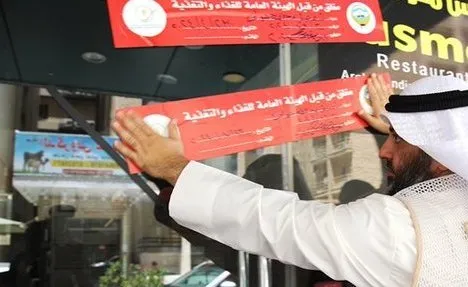
KUWAIT: Muhammad Al-Kandari, the Hawalli Governorate Inspection Supervisor at the Food and Nutrition Public Authority, has announced the closure of four food establishments in Hawalli and Salmiya due to severe violations. The closures were part of an ongoing effort to ensure food safety and public health through rigorous inspections and adherence to international food safety standards. In an interview with Al-Anba newspaper, Al-Kandari explained that these closures are part of a broader initiative to maintain high safety standards in food production and distribution.
The inspection tour revealed multiple violations, including the presence of flying and crawling insects in food preparation areas, poor personal hygiene among staff (such as untrimmed nails), and the sale of adulterated or expired food products. These infractions prompted immediate legal action and the closure of the offending establishments. Al-Kandari stressed that even if the food products currently appear safe, conditions can change over time. Thus, reopening is contingent upon a thorough re-inspection to ensure all violations have been resolved. The closed establishments undergo temporary reopening to allow for corrective measures, after which inspectors return for follow-up checks. Only once all issues are resolved, and previous violations are addressed, is permanent reopening permitted. The closed establishments include a bakery, a sweets shop, and a restaurant in the Hawalli area, along with two restaurants in the Salmiya area.
The Food and Nutrition Public Authority’s inspection team has been conducting regular visits throughout the governorate to monitor compliance and enforce regulations. Al- Kandari emphasized that these efforts are essential to protect consumer health and uphold food safety standards in the market. Al-Kandari’s team remains committed to ensuring that food establishments meet safety requirements. This commitment reflects the Authority’s dedication to implementing effective policies and control systems in accordance with international standards. These actions contribute to preserving public health and maintaining consumer confidence in food safety.
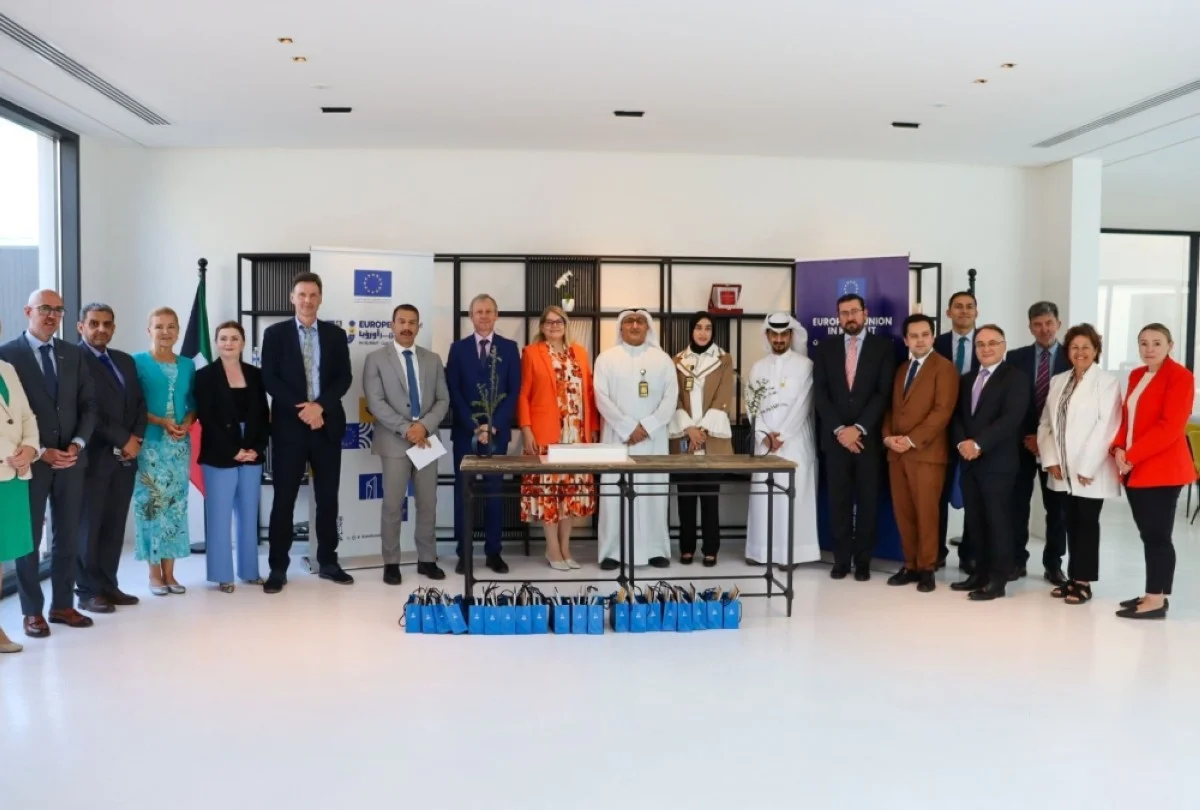
KUWAIT: The EU Ambassador to Kuwait Anne Koistinen presented the 2023 Chaillot Prize for the Promotion of Human Rights in the GCC region to the Kuwait Society for Human Rights. The European Union awards the Chaillot Prize every year for actions, campaigns, projects and lifetime achievements that favor human rights promotion and awareness in the GCC region. The Prize is named after the Palais de Chaillot in Paris where the Universal Declaration of Human Rights was adopted by the United Nations General Assembly on December 10, 1948.
In her speech during the ceremony held at the EU residence in Kuwait, Ambassador Koistinen said: “I am honored to present the Chaillot Prize for the Promotion of Human Rights in the GCC region to the Kuwait Society for Human Rights for their unwavering dedication over the years to promoting and advancing human rights in Kuwait. I would like to highlight in particular their work in supporting and advocating for migrant workers’ rights in Kuwait and raising awareness about their labor rights. Engagement with the civil society in Kuwait is a very important part of EU delegation’s work, therefore I am looking forward to continuing our long-standing cooperation with the Kuwait Society for Human Rights.”
Khaled Al-Humaidi, President of the Board of Directors of the Kuwait Society for Human Rights, said in his speech during the ceremony that ‘To be honored today by awarding us the Chaillot Prize for Human Rights is a great moral support for the Kuwait Society for Human Rights. This Society has taken upon itself the responsibility of defending human rights and promoting them in the Kuwaiti society through concerted efforts at the government and community levels.
We are delighted that the Chaillot Prize was granted to us for our tireless efforts in protecting the rights of migrant workers in Kuwait through the ‘Together Project’, which aims at raising awareness and protecting the rights of migrant workers in Kuwait. This project was implemented by the Kuwait Society for Human Rights in cooperation with the European Union delegation in Kuwait, the Netherlands Embassy, the Swiss Agency for Development and Cooperation, in addition to the US-Middle East Partnership Initiative (MEPI).’
For the EU, promoting and protecting human rights is at the heart of EU external policy as they are among the EU’s founding values of human dignity, freedom and respect of human rights. Cooperation on human rights and engagement with the civil society are an integral part of the relations between the European Union and all countries, including Kuwait. The European Union and Kuwait held their fourth Human Rights Dialogue in Brussels on December 5, 2023 , where the two sides exchanged about the latest developments on both sides and reiterated their commitment to an open and constructive dialogue to jointly address human rights challenges and share best practices.
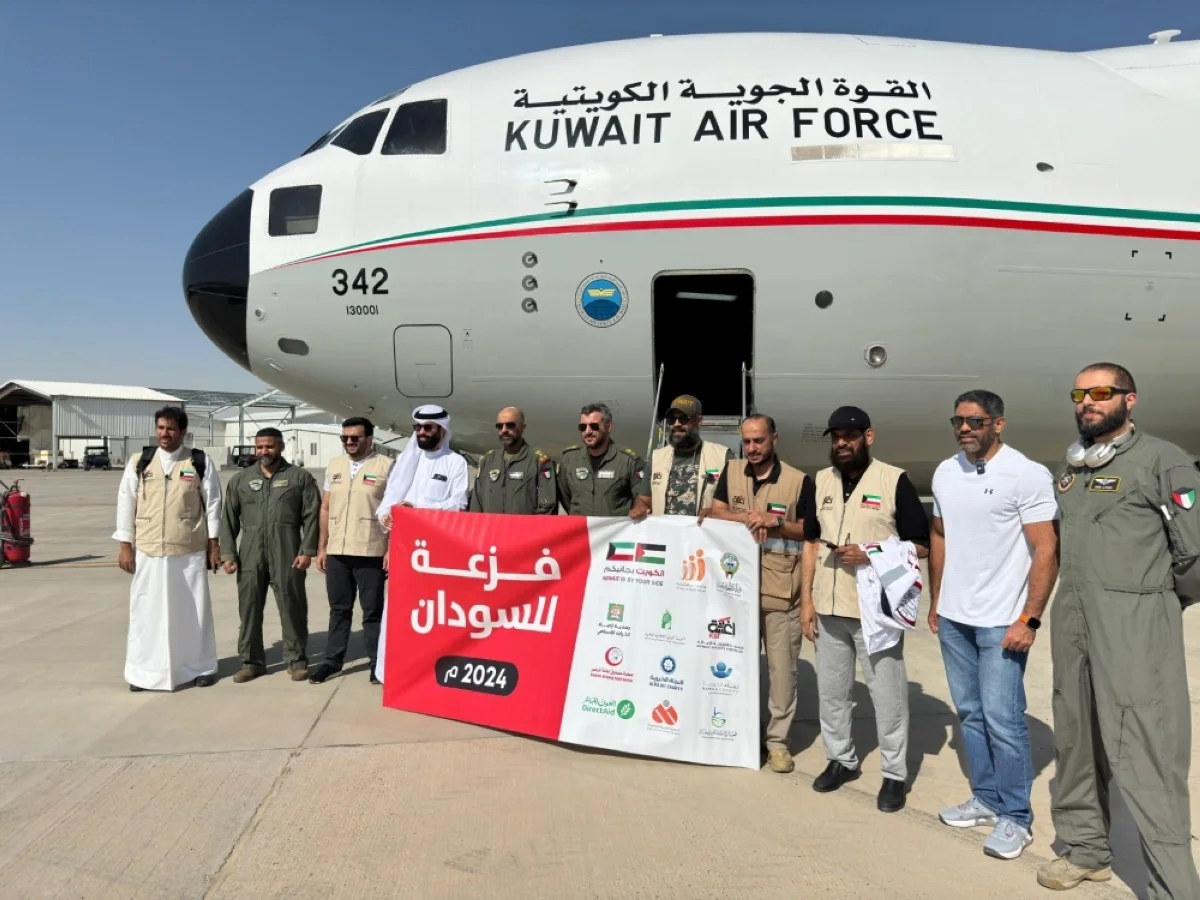
KUWAIT: Kuwait has sent its first aircraft carrying 40 tons of food and medical supplies and ambulances to Port Sudan International Airport. Speaking to KUNA on this occasion, Deputy General Manager of Kuwait Society for Relief Omar Al-Thuwaini said the aid plane is part of a humanitarian campaign that was jointly launched by the society and eight other Kuwaiti charities to help Sudanese people who have been affected by their country’s war.
The Kuwaiti initiative is mainly intended to help answer Sudanese people’s basic needs, primarily food, medicine and shelter, amid the tough living conditions they are facing, he added. In this context, he voiced gratitude and appreciation to Kuwaiti state bodies, chiefly the ministries of defense, foreign affairs, social affairs and information, for their efforts to facilitate and speed up the humanitarian mission.
Chief of Relief and Projects at the Kuwait Society for Relief Mahmoud Al-Mesbah said the first Kuwaiti aid aircraft carried 20 pallets of medical suppliers, 20 pallets of foodstuff and three ambulances. Kuwaiti relief aid comes under the direction of the country’s political leadership for sending necessary humanitarian aid to the Sudanese people to ease the impact of war. Kuwait sent 16 relief aid planes carrying hundreds of tons of food and medical supplies, clothes and ambulances to Sudan in June. — KUNA

KUWAIT: Following a report from a concerned parent, the Public Prosecution has ordered the detention of a 24-year-old Syrian expatriate working unofficially at a private school despite holding a family residence permit. The parent accused her of using a needle obtained from the school clinic to inject his son and threatening other students to exert control over them.
According to details provided by a security source to Al-Jarida, the incident unfolded when the Salmiya Police Station received a report from a parent alleging that his son had been physically assaulted and intimidated by a female worker at the school in the Salmiya area. The parent claimed that the female worker had used a syringe to threaten his son and other students.
Upon investigation, it was discovered that the employee was working in violation of the school’s regulations, and her residency status did not permit her to be employed at the school. When questioned by security officials, the expatriate admitted to bringing the syringe needle from the school clinic in an attempt to scare the students during a period of unrest in the classroom. She claimed that she did not intend to harm anyone, specifically the complaining student.
A case was registered and forwarded to the General Department of Criminal Investigation – the Juvenile Police Department, which subsequently referred it to the Public Prosecution. The Public Prosecution decided to detain the expatriate woman pending further investigation, which will involve the school administration and the complaining student.
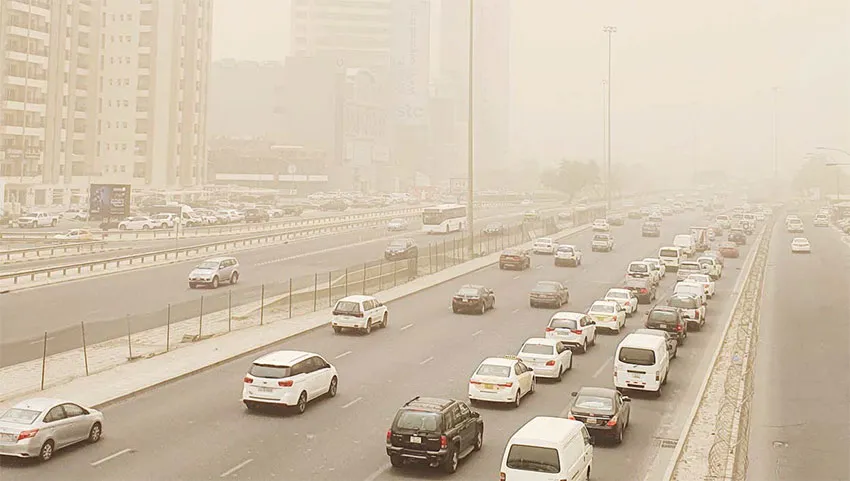
KUWAIT: The Meteorological Department has issued a weather advisory alerting residents of Kuwait to anticipate heightened activity in northwesterly winds. According to officials, wind speeds may surpass 50 kilometers per hour, potentially causing dust storms and reducing horizontal visibility, particularly in exposed areas. Additionally, the advisory warns of the possibility of increased sea waves along the coast.
The advisory, effective for 10 hours, will commence at 10 a.m. and conclude at 8 p.m., guiding residents to prepare for adverse weather conditions during this period.
Residents are urged to exercise caution, particularly when driving or venturing outdoors, and to stay informed about updates from local authorities regarding the evolving weather situation.
For further information and updates, individuals are advised to consult official sources and adhere to safety guidelines provided by the Meteorological Department.

